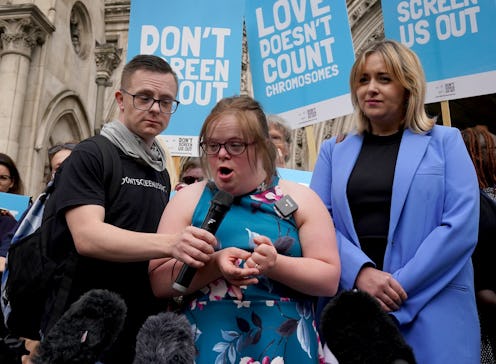Health
Heidi Crowter Loses Legal Battle Over Down Syndrome Abortion Laws
Two senior judges said that the issue would need to be debated in parliament rather than dealt with in litigation.

Heidi Crowter, a 26-year-old woman from Coventry living with Down’s Syndrome, has lost a court case she brought against the government in relation to current abortion laws. Crowter argued that existing legislation does not respect her life, but her case was denied by two senior judges.
Current law across England, Scotland, and Wales states that abortion is allowed up until 24 weeks into a pregnancy, unless “there is a substantial risk that if the child were born it would suffer from such physical or mental abnormalities as to be seriously handicapped.” This includes Down’s Syndrome.
Crowter brought the case to court alongside two other parties: a child with Down’s Syndrome who is being referred to as “A” and Máire Lea-Wilson from Brentford, whose son Aidan lives with the condition.
Lawyers for Crowter argued in court that the current laws are unlawfully discriminatory and are incompatible with the European Convention on Human Rights.
However, judges struck down the claims, maintaining that changing current laws in relation to abortion were not for them to decide upon.
“The issues which have given rise to this claim are highly sensitive and sometimes controversial,” said Lord Justice Singh and Mrs Justice Lieven. “This court cannot enter into those controversies; it must decide the case only in accordance with the law.”
They added that this was a matter for Parliament “which can take account of different interests and viewpoints, rather than in litigation.”
While hesitant not to comment too much on the current laws, the judges did explain that they do not believe there is any evidence of discrimination in the law, and that there are actually provisions in place to firmly discourage it. They also noted that some conditions can only be found later on in a pregnancy, after 24 weeks.
They said: “[T]he ability of families to provide a disabled child with a nurturing and supportive environment will vary significantly.
“There is powerful evidence before this court of families which provide a loving environment to children who are born with serious disabilities but we do not know what would happen, in a counterfactual world, in which some women have been compelled by the fear of the criminal law to give birth to children who will not be loved or wanted.”
Speaking about the conclusion, Crowter said she would continue to keep fighting. She commented: “The judges might not think it discriminates against me, the government might not think it discriminates against me, but I’m telling you that I do feel discriminated against and the verdict doesn’t change how I and thousands in the Down’s syndrome community feel.”